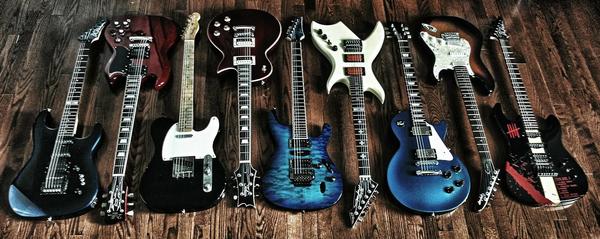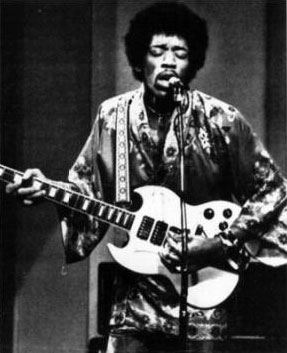
Pick any proheminent guitar player. The odds to be related to a guitar model are very high. The intent isn’t to write an academic thesis, but only a short note about the subject. If anyone is really interest in writing a thesis about it, we can always talk.
This article was triggered by UG’s “Top 5 Rockers That Have Relied On Strats” and made me give some thought about the great deal of guitarists I know and their preferred guitar models. Read the full article here. Most guitarists I was able to think of were guitar model related. I guess most of you have given that kind of thought anytime in your lives. From jazz players to bluesmen, from rockers to extreme metallers, they all have a preferred model, or even models. They may have been unfaithful once in a while in their career, but they remained loyal to a guitar model. Even Hendrix was seen with an SG model. Here’s the proof:

But why is that?
There are a lot of reasons, but we can sum them up in two: the ones guitar-related and the ones guitarist-related. Both play important roles to their sonance and explain their signature sound. There is a third option which is equipment related, which I guess is very important to some guitarists, but in order to make things easier, we’ll let this one out for now.
prominent guitarists are the ones who set a musical stapler. They are the ones who you recognize their signature sound when listening to any of his songs. Listen to Here n’ Aid’s “We’re Stars” to check it out what I mean. Yngwie Malmsteen, Brad Gillis, and Vivian Campbell are easily recognizable among other lead guitars. Even if you don’t know them, you’ll feel that their solos are somewhat different.
https://youtu.be/P7eqxg92YG0
Guitar-Related Reasons
It’s subtle, but any guitar model has its signature sound due to an ample variety of reasons. In short, any guitar part can influence its sound: neck, body (the wood, varnish, solid or not), bridge, pickup, whammy bar, and on. Of course, with all the new digital devices available these days, one can emulate any guitar signature sound. Well, I guess not really, but that’s another discussion.
High-profile guitar models like SG, Stratocaster, Les Paul, and others have all their strong signature sound. I’d rather call it personality because it fits to guitarist-related items. To be frank, in terms of quality they are all alike. One little item here, another little thing there, but they are the same high quality products. Guitarist-related reasons are the ones which untie the game. Now we can go to them.
Guitarist-Related Reasons
Bottomline, they are taste-related. One likes a thicker sound, other prefers a lighter instrument, the other one loves the shape, and go on. There is no way of denying that guitar models are a personal choice. Of course, the kind of music the guitarist plays enlarges or diminishes the variety of models possible. But that’s not exactly the point. The guitarist wants to have a match between his musical taste and the guitar sound. There are other reasons as affective memory: he wants the same model as his idol (Malmsteen and Blackmore), the guitar was a present from a relative (Brian May), the guitar he could afford that time, and others. These reasons make guitarists get more loyal to a guitar model than others. Or it’s a leap of faith that determines it. Tony Iommi used to play a Fender Stratocaster that was spraypainted white. However, here’s the leap of faith, the neck pick-up malfunctioned during the recording of Sabbath’s first album, so he quickly turned to his backup Gibson SG to finish the record. The rest is history.
The thing is, there are two types of guitarists (maybe extended to musicians) or a guitarist is worried about having his own style or he likes to copy other’s. First case produces the most prominent ones; second, well, sometimes it works. I say that because from the beginning the first type will look up for things to stand out from the crowd and being related to a guitar model does it pretty well. Malcom Young did the hell of things to his Gretsch G6131-MY to make it work for him. A wanna-be prominent guitarist will work hard to find his signature sound. No matter what. The second type will also work hard to sound like his idol. No matter what.
Another important factor to get a signature sound is the tuning. Most prominent guitarists use a different one from the A standard. Some players go beyond, Joe Bonamassa, for instance, uses a Telecaster tuned to F because he claims to do a lot of bending when playing ‘Slow Train.’ Keith Richards uses an open G tuning. It explains why it is so difficult to sound exactly like the Rolling Stones. Alternative tunings have two reasons: one is technical as Joe’s and the other is taste-related. I remember my guitar teacher claimed to use different tunings according to the strings wear: when new, a kind of tuning; when worn, a different one. I never had the ears for that, but nevermind.
Answering to the question at the top, from where I’m standing I guess they play a very important role. Though, to be a prominent and be related to guitar model isn’t exactly a rule. Of course, there are prominent guitarists that aren’t related to a particular guitar model. Billy Gibbons, for instance. But it helps a lot to have a signature sound.
P.S.: Thanks to Playing With Chaos for the guitar collection pic.